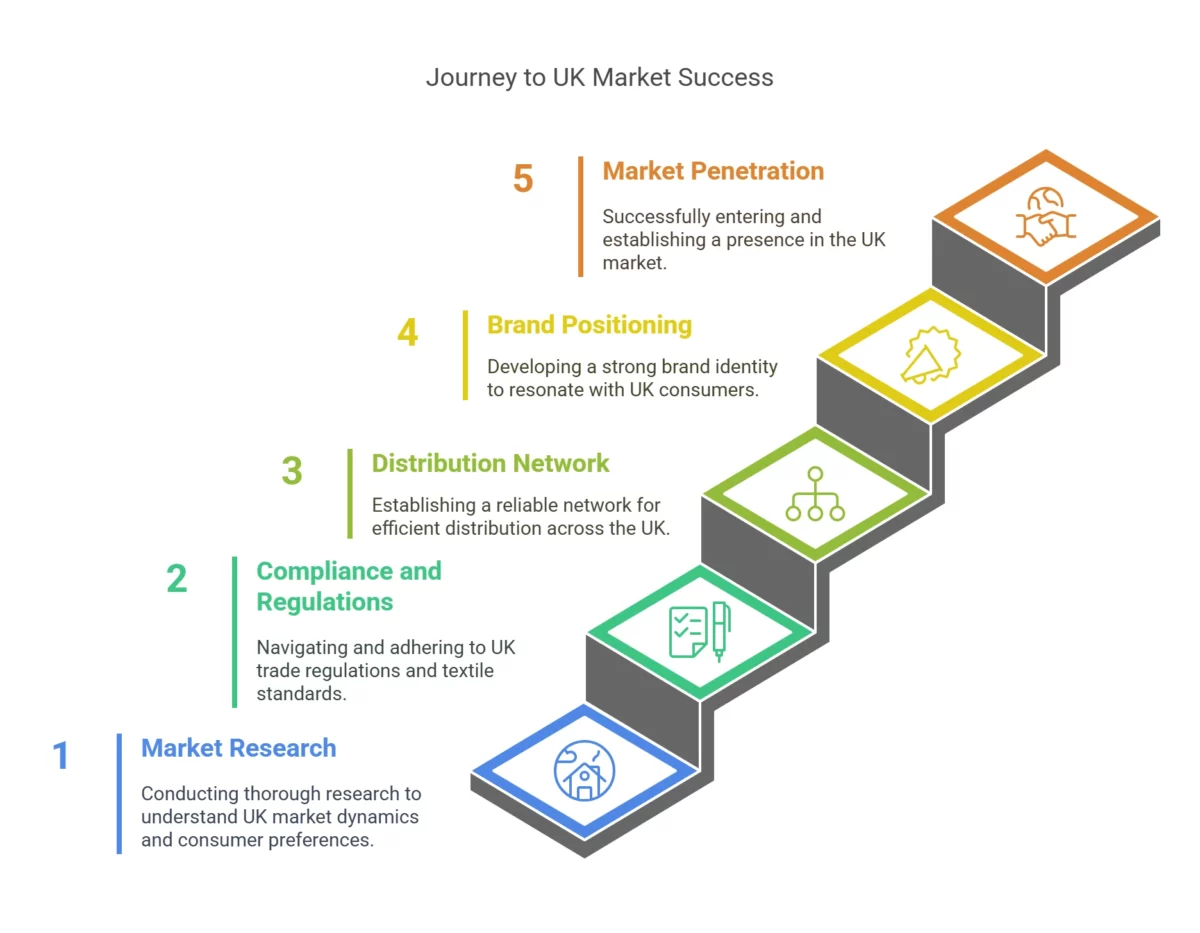The UK remains one of the most lucrative markets for textile and apparel exporters, but navigating regulations and competition requires a well planned strategy. In recent years, exports from India to the UK have grown by 31.51%, signaling increased demand for South Asian textiles. This growth presents a significant opportunity for exporters looking to enter or expand within the UK market.
This blog presents a case study-style approach to UK textile trade insights, UK fashion import strategies, and compliance for UK textile exports, illustrating how exporters can achieve apparel market success stories and build thriving clothing export business examples.
Case Scenario: A Textile Exporter’s Journey to UK Market Success
Company Profile
EcoWear Ltd., a mid-sized textile manufacturer in Bangladesh, specializes in organic cotton garments. With sustainability becoming a dominant trend, the company identified the UK as a strategic market for expansion in 2025. Their goal was to enter and comply with all regulations while ensuring profitability successfully. They recognized that the UK’s consumer base was shifting toward ethically produced textiles, and this was a key opportunity for market entry.
Understanding the UK Market Landscape
Market Insights & Trends
Before launching, EcoWear conducted in-depth research into UK textile trade insights. They discovered key trends, such as:
- The rise of ethical fashion and sustainable sourcing.
- Consumer demand for transparency in textile production.
- Increased regulatory scrutiny post-Brexit.
- Preference for locally stocked and distributed products for faster delivery.
- A growing market for premium organic cotton apparel.
To align with these trends, they decided to position themselves as a sustainable, high-quality clothing supplier for UK retailers. They also invested in digital marketing campaigns to test the UK audience’s response before officially launching.
Compliance for UK Textile Exports
One of the biggest hurdles for EcoWear was navigating compliance for UK textile exports. Key steps included:
1. Understanding Post Brexit Regulations
- They worked with trade experts to ensure compliance with UKCA marking and new import duties.
- Understanding Rules of Origin requirements to determine eligibility for tariff reductions.
- Working with customs brokers to simplify import documentation.
2. Meeting Sustainability Standards
- Obtaining GOTS (Global Organic Textile Standard) and OEKO-TEX certifications to reassure UK buyers.
- Ensuring ethical labor practices aligned with UKu sustainability expectations.
- Using biodegradable packaging to reduce environmental impact.
3. Labeling and Packaging Compliance
- Ensuring labels met UK-specific requirements, including fiber content, care instructions, and country of origin.
- Providing multilingual labeling to cater to diverse UK consumers.
- Including QR codes for digital sustainability tracking.

UK Fashion Import Strategies: Overcoming Market Entry Challenges
To gain traction in the UK, EcoWear implemented several UK fashion import strategies:
1. Choosing the Right Market Entry Model
- B2B Partnerships: EcoWear targeted UK fashion retailers looking for sustainable product lines. They secured contracts with department stores and eco-friendly boutiques.
- E-commerce Expansion: Selling directly through UK-based online marketplaces such as ASOS and Zalando ensured a strong D2C presence.
- Subscription Box Collaborations: Partnering with UK-based fashion subscription boxes helped introduce the brand to a niche audience.
2. Optimizing Logistics and Distribution
- Partnering with a UK-based fulfillment center to reduce shipping times and comply with Brexit-imposed border checks.
- Implementing a digital inventory system for real-time tracking and automated reordering to prevent stock shortages.
- Adopting a hybrid distribution strategy: maintaining a warehouse in the UK while keeping production offshore.
3. Marketing and Brand Positioning
- Highlighting sustainability in brand storytelling through behind-the-scenes content about their production process.
- Collaborating with UK fashion influencers to gain consumer trust and build an authentic brand presence.
- Offering limited-edition collections with UK-based designers to appeal to high-end fashion consumers.
- Running social media campaigns emphasizing transparency, fair wages, and eco-friendly practices.
- Implementing customer loyalty programs to incentivize repeat purchases.
Results and Lessons Learned
Within 18 months, EcoWear successfully expanded into the UK market. Their achievements included:
- A 40% increase in sales through strategic UK fashion import strategies.
- Establishing long-term contracts with UK retailers.
- Strengthening their direct-to-consumer presence by leveraging UK-based e-commerce platforms.
- Full compliance with UK textile trade insights, ensuring seamless operations and adherence to sustainability benchmarks.
- Developing a sustainable supply chain model that positioned them as an industry leader in ethical apparel.
- Receiving recognition in UK fashion publications for their commitment to sustainability.
Challenges and Future Outlook
While EcoWear achieved significant success, they faced several ongoing challenges:
- Rising production costs: As global cotton prices fluctuated, maintaining profitability required optimizing supply chain efficiencies.
- Consumer education: Many UK shoppers were unaware of the benefits of organic cotton, requiring continued brand advocacy.
- Competition from fast fashion: Competing against high-volume, lower-priced brands meant emphasizing quality over cost.
Looking ahead, EcoWear plans to:
- Launch an exclusive sustainable sportswear line for UK customers.
- Expand their presence in physical retail stores in London and Manchester.
- Invest in AI-driven demand forecasting to further improve inventory management.
- Collaborate with UK policymakers on setting higher sustainability standards within the textile industry.
Conclusion
EcoWear Ltd.’s case demonstrates the significance of compliance, market research, and strategic entry approaches in achieving apparel market success stories. By focusing on sustainability, regulatory compliance, and a diversified market entry strategy, they built a strong foothold in the UK fashion sector. Their journey serves as a roadmap for businesses looking to create their own clothing export business examples and thrive in the UK textile industry in 2025 and beyond. For textile exporters, the key takeaway is clear: a data-driven approach, combined with strong compliance measures and innovative market entry strategies, can pave the way for long-term success in the UK market.
FAQs
Exporters must adhere to UKCA marking, follow labeling regulations, and ensure proper documentation for customs clearance. Sustainability certifications like GOTS and OEKO-TEX are also highly valued.
Partnering with local fulfillment centers, using AI-driven inventory management, and leveraging hybrid distribution models can significantly improve delivery efficiency and reduce costs.
Building B2B partnerships, expanding through e-commerce, and collaborating with local influencers are crucial for penetrating the UK fashion market successfully.
Emphasizing sustainability, ensuring quality control, and leveraging digital marketing strategies can help brands stand out against fast fashion competitors.








